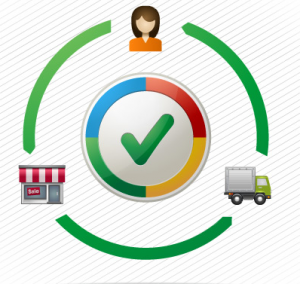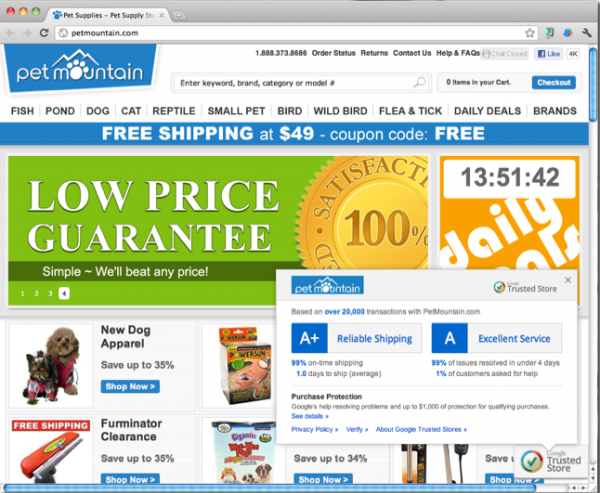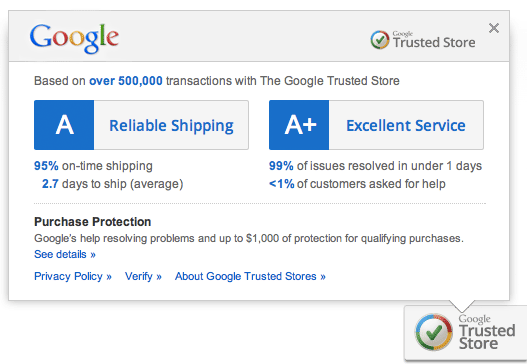Google Gets Into Ratings Game With Trusted Stores
Google is launching an e-commerce certification program this morning called “Trusted Stores.” The company says that it’s trying to give consumers greater confidence to buy products online. In very limited beta right now, qualifying e-commerce stores will be able to display a “Google Trusted Store” badge. What’s more interesting is that Google is backing its […]
 Google is launching an e-commerce certification program this morning called “Trusted Stores.” The company says that it’s trying to give consumers greater confidence to buy products online. In very limited beta right now, qualifying e-commerce stores will be able to display a “Google Trusted Store” badge. What’s more interesting is that Google is backing its program with $1,000 in consumer purchase protection (more on that in a minute).
Google is launching an e-commerce certification program this morning called “Trusted Stores.” The company says that it’s trying to give consumers greater confidence to buy products online. In very limited beta right now, qualifying e-commerce stores will be able to display a “Google Trusted Store” badge. What’s more interesting is that Google is backing its program with $1,000 in consumer purchase protection (more on that in a minute).
To qualify as a Trusted Store etailers must apply and voluntarily provide a range of data to Google. Google believes getting data directly from online retailers is more reliable than doing consumer surveys.
Trusted Stores must have a track record of on-time shipping and reliable customer service. Regarding customer service in particular, the etailer must have a history of quick resolution of consumer problems and issues.
The badge will appear on participating etailer websites as shown in the mockup above (lower right). When a consumer mouses over the badge he or she will see the store’s “grades” for shipping and customer service:
Google told me that there was no connection or tie-in to AdWords, as there was with Google Checkout. I asked about whether the “Trusted Stores” would be able to use that icon in AdWords advertising and they said they hadn’t made any decisions on that. As I spun out various logical scenarios Google cautioned that the program was very new and the company would need to see how things played out before making any decisions about ways to expand or enhance the program.
Most interesting to me was the consumer purchase protection aspect. There’s some fine print like $1,000 in lifetime benefits for any individual. But the program is bold and gives Trusted Stores a more compelling dimension that if it simply rated the sellers. The consumer protection aspect is very much like a credit card extending the manufacturer’s warranty on a purchase. To be clear, Google isn’t extending warranties but it’s offering a kind of money back proposition if there’s a problem and the etailer doesn’t resolve it.
To get the benefit of the program the consumer must opt for the purchase protection, which is free. Then, if there’s a problem, the consumer must first contact the seller. If the merchant is not resolving the issue then the consumer can contact Google to help expedite a solution to the problem or potentially get money back. Google has the clout to get sellers to resolve problems quickly.
People will immediately assume some ulterior motive on Google’s part, that there’s something hidden here. I presented this idea to Google, which said that it was really just seeking to boost e-commerce spending by giving consumers more confidence to buy things online. I believe Google, although on some white board somewhere it’s possible that there are potential future integrations with Checkout and/or Wallet. But this is just speculation on my part.
I would also expect, assuming the program continues and grows, that Trusted Stores badges will eventually show up in AdWords. Again, this is my speculation.
It’s not entirely clear what data will be captured by Google in this process. However I believe the company will have a record of your transactions if you opt for the purchase protection.
Contributing authors are invited to create content for Search Engine Land and are chosen for their expertise and contribution to the search community. Our contributors work under the oversight of the editorial staff and contributions are checked for quality and relevance to our readers. The opinions they express are their own.
Related stories
New on Search Engine Land


